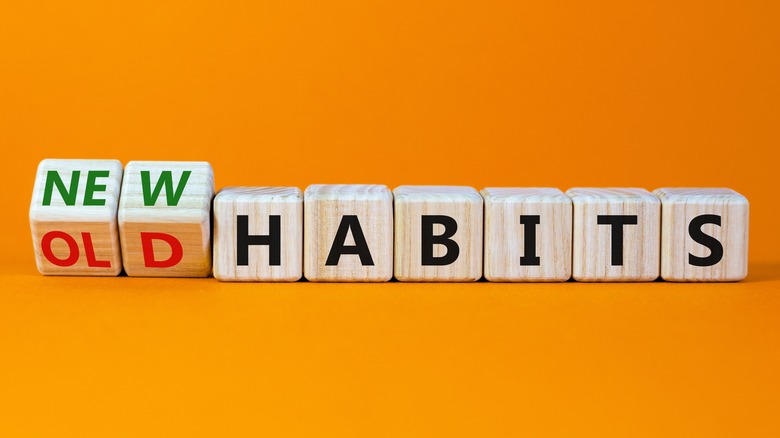How Long Does It Really Take To Form A Habit?
We all have habits that we practice — both consciously and unconsciously. Whether it's deliberately laying out your gym clothes the night before a workout, or unknowingly biting your nails when feeling stressed, we engage in numerous habits throughout the course of a single day.
When looking to incorporate new habits into our lives, rumor has it that all it takes is 21 days of repetition (via Science Alert). Sounds too good to be true? Well, that's because it might be. While the timeline for habit formation will vary from one person to the next, science has shown that, generally speaking, we as humans need far more than three weeks to solidify a new behavior.
Researchers of a 2009 UK study published in the European Journal of Social Psychology set out to determine how long it takes for a new healthy habit to become automatic. A total of 96 students ages 21-45 were asked to select a healthy eating, drinking, or exercise behavior of their choosing that could be easily incorporated into their day for a period of 12 weeks. For some, their new habit became ingrained in as little as two and a half weeks, while for others, it took as many as 254 days. However, on average, participants were able to solidify their new habit within roughly 66 days' time.
21 days is just the beginning
The 66-day rule doesn't seem to just apply to behaviors. Rather, research conducted by neuroscientist Dr. Caroline Leaf suggests that it takes roughly this same amount of time to effectively integrate new healthy thought patterns as well. "Habits don't form in three weeks; they form in nine weeks," Dr. Leaf told MindBodyGreen. Dr. Leaf's research showed that while it took about 21 days for new thoughts to form in participants, it took about 63 days for said thoughts to become habits. "It takes three weeks to get gamma peaks in the brain, which means that we can reconceptualize [thoughts]," Dr. Leaf told MindBodyGreen after analyzing brain imaging technology results. "In order to make [the waves] strong enough to impact behavior change, we need another 42 days."
While it's nice to know we can let ourselves off the hook when it comes to habit-forming speed, why is it that it still takes some of us longer to get a habit into full swing than others?
Forming habits versus breaking habits
Neuroscientist and author Dr. Brian King writes via Psychology Today that the difference may lie in the degree of reward associated with the behavior. In other words, the more pleasure it prompts in the brain, the quicker the habit will develop. On the other hand, a habit with a delayed pay-off will require more effort. This same logic can be applied to breaking habits, which experts say have a far less clear timeline (via Science Alert). This is particularly true if the habit you're trying to kick stimulates the pleasure center of the brain, such as smoking cigarettes.
However, motivation may also play a critical role when it comes to effectively breaking a habit. "People who want to kick their habit for reasons that are aligned with their personal values will change their behavior faster than people who are doing it for external reasons such as pressure from others," neuroscientist Elliot Berkman told Science Alert.



